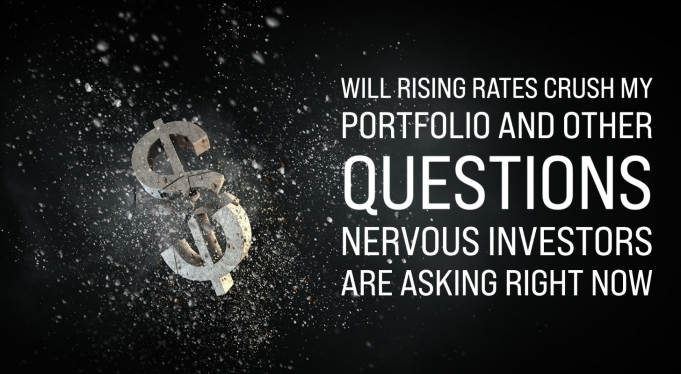Our company, since inception in 2012, has now answered more than 124,000 customer investment questions. Once a year or so, we highlight some of the popular questions and concerns in this column. With stock markets suddenly not-so-friendly anymore, investors have become a little worried, and this is reflected daily in our question and answer feature. Let’s look at five issues customers have brought up recently:
Should I sell all my bonds?
Most investors know that bond prices decline when interest rates rise. With the recent rate scare — 10-year yields at 1.5 per cent. Yikes! (Just kidding) — many investors are wondering why they hold any bonds at all. We think this thinking needs to stop. First, bonds are not in your portfolio to make capital gains — they are there to provide balance and regular income. Second, as we’ve noticed this week, the fear of higher rates can hurt the stock market at times, also. Going 100 per cent equities from a 60/40 stock/bond split could have serious consequences to an investor. If not in performance, then most definitely in stress and sleep. We would suggest sticking to your overall investment plan, and to not “react” to short-term market events with big portfolio changes.
Where can I park my cash where it is safe and actually earns something?
This is perhaps our most common question these days. Investors earn nothing on their cash balances at banks, and are looking for something — anything — that still gives them a decent rate of return, but with a high degree of safety. Our answer is not rocket science: GICs are still best. Yes, one can buy a high-interest savings ETF, or some bond funds, or some balanced funds with some equity exposure. But any exchange traded product is going to carry some risk, even if only market risk. Any product with equity exposure is going to have risks. Bond funds can decline in a higher-rate environment. Nope, we suggest sticking with the basics: If one looks around for one of the smaller trust companies, investors can still get close to two per cent on some promotional GIC rates. Make sure the company is CDIC insured, and keep amounts below the $100,000 insurance threshold. The rate is not much, but a guarantee is a guarantee, not available in many other places (government bonds held directly and to maturity is one other).
Why did my company raise money if it didn’t need it?
Many companies, such as Shopify and Ballard Power, have raised money recently, even though each already had a substantial cash position. To some investors, the cash raise seems unnecessary. But we are not privy to the discussions at companies’ boards. A company might be planning a big acquisition, a big growth initiative, or other corporate activity. The board might just be, well, nervous. Shopify now has more than $7 billion in cash on its books. Does it need it all today? Probably not. But it will be there when it decides it does. Now, we still don’t like companies issuing stock willy-nilly with no plans for the money. But it becomes harder to fault a company for raising money after its stock has soared. Keep this in mind the next time one of your companies sells new shares.
My stocks always tank after earnings. Should I just sell before each report?
Honestly, this one got us: This year, at least, this would have been a solid plan. We never like strategizing around a single quarterly report, but in 2021 it seems no matter how good a company reported, their stock still declined, sometimes a lot. But we are chalking this one up to coincidence. Fourth-quarter earnings reporting simply coincided with a big shift in the market. Many companies reported strong earnings in the middle of a volatile tape. There is no guarantee such a “sell-before-earnings” strategy is going to work in the next earnings season. In fact, market reaction could very much be the exact opposite. Again, the best strategy here is to invest for the long term. Quarterly earnings should not be that significant to long term holders.
Are higher interest rates going to crush my portfolio?
Our answer: Not yet. While everyone freaked out about 10-year yields this week, we reminded customers that rates were higher in 2019 and markets did just fine. Equity markets, after a rough start, tend to do quite well even in times of slowly rising interest rates. There are two keys here: the first is “slowly.” A spike up in interest rates is never good for a portfolio. Two, higher rates need to be accompanied by better economic growth. Right now, investors are pricing in a re-opened world and a return to normalcy. That should be very good for equities, generally-speaking. Problems arise when we get higher interest rates and no growth. That’s when it is really time to worry. But we are a long way from four per cent rates, and if the economy can’t grow after the disaster we call 2020, then we are all going to be in a bit of trouble.
Take care,

Thinking about becoming a 5i Research Member?
Do your 2021 goals include growth in your DIY Investments? If so, no need to go at it alone. Start your free trial today, and see for yourself how 5i Research can help you elevate your Investment Game.







Comments
Login to post a comment.